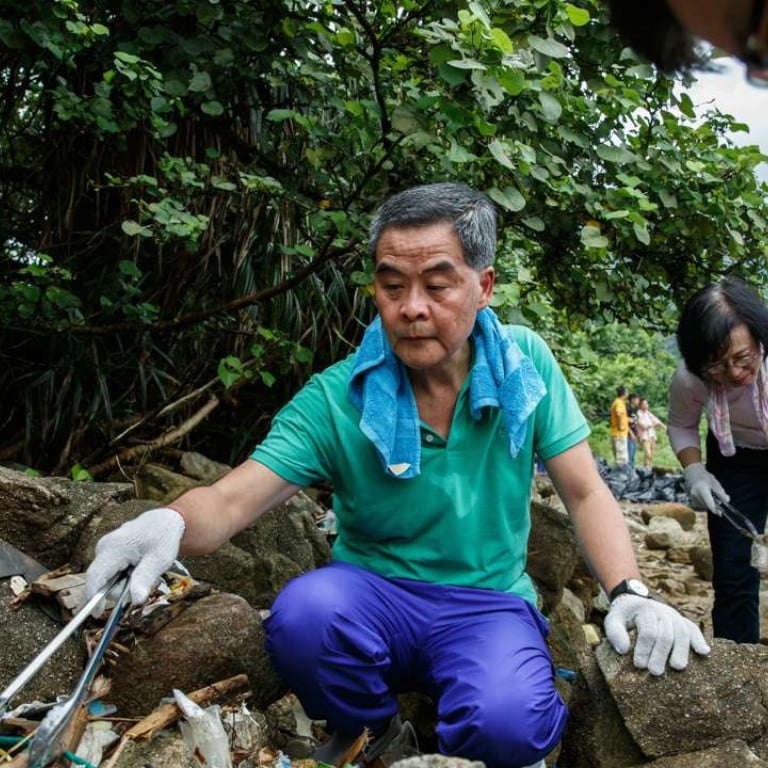
Facebook posts, iPhone queues ... why is Hong Kong’s leader even bothered about popularity?
Last week, pictures circulated online of Hong Kong’s Chief Executive Leung Chun-ying in a white Polo shirt and casual khakis, standing in a queue. A few days later, he confirmed its veracity on his Facebook page.
Netizens swiftly condemned him for what they saw as a publicity stunt to show he is a man of the people. If that was his intention though, the bid backfired. It was a queue for the new iPhone 7. He said he needed one because someone at home had broken an iPhone 6. Since Apple’s latest phone costs more than one third of the median monthly income of HK$15,000, that day in the life of the chief executive was not as relatable as he might have hoped.
Call for Hong Kong Chief Executive CY Leung to retire for sake of harmony
Of course, Leung would hardly be the first politician to wait in line, literally, to present himself as a regular Joe. But this cameo appearance at the Apple store did not score as many points as Barack Obama slurping noodles in Hanoi with celebrity chef Anthony Bourdain. Or Xi Jinping (習近平) tucking into dumplings and sipping beer in a pub – everyday acts apparently so novel for a Chinese leader that they break the internet.
Hong Kong’s chief executive has been starved of lucky breaks and seems incapable of creating one. Every move Leung makes is met with derision from many quarters. He is deeply unpopular, if opinion polls and conversations with ordinary folk are any indication. Yet, he is said to be contemplating a second term. If so, it is not surprising that he is trying to salvage his popularity.
Hong Kong Chief Executive Leung Chun-ying threatens to sue Apple Daily over ‘malicious’ editorial
There are many examples to learn from. Former British Prime Minister Margaret Thatcher, for instance, changed the colour of her hair and had a voice coach from the National Theatre help her soften her image. She even got advice from stage and screen legend Laurence Olivier on how to deliver her prepared speeches with more passion and authenticity.

In the United States, Richard Nixon was famously contemptuous of the public and the press – and the feeling was mutual. He occasionally indulged in risqué banter to present himself as a regular guy, but sometimes so clumsily it just confirmed that he wasn’t.
One such encounter was immortalised in the film, Frost/Nixon, when he greeted his British interviewer David Frost by asking: “Did you do any fornicating this weekend?”

Although self-conscious about his inability to fit in, Nixon’s unusually thick skin enabled him to stick around far longer than most top American leaders. Yes, he eventually resigned mid-term after the Watergate scandal, but he nonetheless had a record of 21 years in public office.
Leung Chun-ying cautious on pensions, working hours
He served as vice-president to Dwight Eisenhower from 1953 to 1960. He ran against John F. Kennedy for the presidency and lost. In 1962, when he lost the race for California governor, a dejected Nixon vowed to retreat from the harsh political limelight and declared to reporters: “You don’t have Nixon to kick around anymore, because, gentlemen, this is my last press conference.”

But in 1968, he made an improbable comeback when he won the presidency. In 1972, he won re-election by one of the largest landslides witnessed in American presidential races.
If Nixon could do it in a freewheeling democracy where public opinion is almost everything, that must give hope to politicians like Leung whose likeability is, shall we say, a work in progress.
Hong Kong Chief Executive Leung Chun-ying stands firm on accusations about his role in ICAC controversy
Unlike for would-be leaders of democracies, mass popularity is not technically a requirement for pretenders to the position of Hong Kong chief executive. The vote will be conducted within a closed shop of 1,200 members comprising the election committee. And before that, the blessing of candidates will be an even more opaque and exclusive decision.

As speculation mounts on who might be running in the chief executive race come March, what is even less transparent is how much weight the powers-that-be up north will give to local public opinion in Hong Kong.
It is not likely, though, that any out-and-out populist will get to run. Beijing will surely want to feel secure in the knowledge that, in any major conflict with Hong Kong, the chief executive won’t be the sort who will stand up for Hongkongers against what Beijing sees as the core interests of the People’s Republic.
Hong Kong politicians tell Beijing official Chief Executive Leung Chun-ying is not the man for the job
Leung has that much going for him.
What is less clear is whether Beijing would also expect a post-2017 chief executive to command a minimum level of local popularity, and if so what that level is. Hongkongers can only hope Beijing would see the wisdom of having a CE who is held in sufficiently high regard to broker acceptable compromises and break the debilitating policy impasses now afflicting the city.
If so, a moderate level of popularity must be among the qualifications for the job. Leung will have to aim for that, if he wants a new term. So look out for a familiar face in a queue near you.
Zuraidah Ibrahim is the editor of This Week in Asia
Correction: An earlier version of this article had stated incorrectly that Nixon was impeached.

